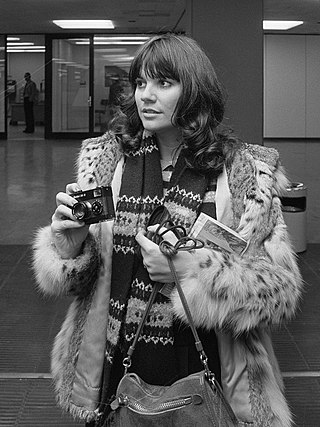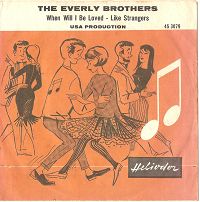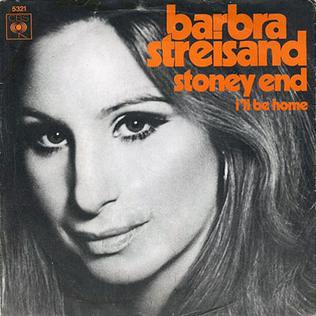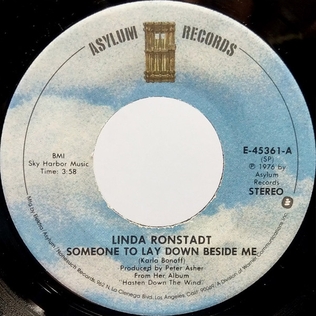
Linda Maria Ronstadt is an American singer who performed and recorded in diverse genres including rock, country, light opera, the Great American Songbook, and Latin music.

"That'll Be the Day" is a song written by Buddy Holly and Jerry Allison. It was first recorded by Buddy Holly and the Three Tunes in 1956 and was re-recorded in 1957 by Holly and his new band, the Crickets. The 1957 recording achieved widespread success. Holly's producer, Norman Petty, was credited as a co-writer, although he did not contribute to the composition.

Andrew Maurice Gold was an American multi-instrumentalist, singer, songwriter, and record producer who influenced much of the Los Angeles-dominated pop/soft rock sound in the 1970s. Gold performed on scores of records by other artists, especially Linda Ronstadt, and had his own success with the U.S. top 40 hits "Lonely Boy" (1977) and "Thank You for Being a Friend" (1978), as well as the UK top five hit "Never Let Her Slip Away" (1978). In the 1980s, he had further international chart success as one half of Wax, a collaboration with 10cc's Graham Gouldman.
"Poor Poor Pitiful Me" is a rock song written and first recorded by American musician Warren Zevon in 1976.

Karla Bonoff is an American singer-songwriter. While Bonoff has released a number of albums, she is primarily known for her songwriting. Bonoff's songs include "Home," covered by Bonnie Raitt, "Tell Me Why" by Wynonna Judd, and "Isn't It Always Love" by Lynn Anderson.

"Ooo Baby Baby" is a song written by Smokey Robinson and Pete Moore. It was a 1965 hit single by The Miracles for the Tamla (Motown) label.

Cry Like a Rainstorm, Howl Like the Wind is a studio album by American singer/producer Linda Ronstadt, released in October 1989 by Elektra Records. Produced by Peter Asher, the album features several duets with singer Aaron Neville — two of which earned Grammy Awards — and several songs written by Jimmy Webb and Karla Bonoff. The album was a major success internationally. It sold over three million copies and was certified Triple Platinum in the United States alone.
"All My Life" is a hit song written by Karla Bonoff and originally performed by Bonoff on her album New World (1988).

"Lonely Boy" is an international hit song from 1977, written and recorded by Andrew Gold in 1976 for his album What's Wrong with This Picture? It spent five months on the American charts, peaking at number seven in both Canada and the United States, the latter for three consecutive weeks on June 11, 18 and 25, 1977, and number 11 in the United Kingdom. While "Lonely Boy" would be Gold's biggest U.S. hit, his track "Never Let Her Slip Away" achieved greater success in the U.K.

"You're No Good" is a song written by Clint Ballard Jr., first performed by Dee Dee Warwick for Jubilee Records in 1963 with production by Jerry Leiber and Mike Stoller. It has since been covered by many artists, including charting versions by Betty Everett in 1963, The Swinging Blue Jeans in 1964, and Linda Ronstadt in 1974, whose version was a number 1 hit in the United States.

Silk Purse is a studio album by American singer Linda Ronstadt. It was released by Capitol Records on April 13, 1970 and was Ronstadt's second solo studio album in her career. Silk Purse contained a total of ten tracks that experimented with country music. It included covers of songs by Hank Williams and Mel Tillis. Featured on the album were two singles. Among them was the song "Long, Long Time", which became Ronstadt's first charting single in the US and Canada. Silk Purse was given positive reviews from several publications including AllMusic and Cashbox. It was Ronstadt's first to make chart positions in Australia, Canada and the US.

Hasten Down the Wind is the seventh studio album by Linda Ronstadt. Released in 1976, it became her third straight million-selling album. Ronstadt was the first female artist to accomplish this feat. The album earned her a Grammy Award for Best Pop Vocal Performance, Female in 1977, her second of 13 Grammys. It represented a slight departure from 1974's Heart Like a Wheel and 1975's Prisoner in Disguise in that she chose to showcase new songwriters over the traditional country rock sound she had been producing up to that point. A more serious and poignant album than its predecessors, it won critical acclaim.

The singles discography of American singer Linda Ronstadt contains 80 lead and collaborative singles, four as a featured artist, eight promotional singles and eight other charted songs. Her first credited release was 1967's "Different Drum", which also included the Stone Poneys along with Ronstadt as a featured artist. Ronstadt's first pair of solo singles were released by Capitol Records in 1969. The 1970 release "Long, Long Time" was her first solo charting single. Her 1974 single "You're No Good" topped the US Hot 100, reached number seven in Canada and number 15 in Australia. Its B-side song "I Can't Help It " reached number two on the US Hot Country Songs list. It was followed by 1975's "When Will I Be Loved", which made the top ten on multiple charts in the United States and Canada, including topping their country surveys. It was followed by the US top five song "Heat Wave" and the US country top five song "Love Is a Rose".
"Silver Threads and Golden Needles" is a country song written by Dick Reynolds and Jack Rhodes. It was first recorded by Wanda Jackson in 1956. The original lyrics, as performed by Jackson, contain a verse not usually included in later versions, which also often differed in other minor details.

"Everybody Plays the Fool" is a 1972 song first recorded by American R&B group The Main Ingredient, and written by J. R. Bailey, Rudy Clark and Ken Williams. It was the first single released from the group's album Bitter Sweet, released with the B-side "Who Can I Turn To ". "Everybody Plays the Fool" was the group's highest charting hit single, reaching No. 3 on the Billboard Hot 100 chart in the fall of 1972. It also peaked at No. 2 on the Billboard R&B chart and at No. 25 on the Billboard adult contemporary chart. It was certified gold by the RIAA.

"Right Time of the Night" is the title of a composition by Peter McCann, which became a top-ten hit single in 1977 via a recording by Jennifer Warnes.

"When Will I Be Loved" is a popular song written by Phil Everly of the Everly Brothers, who had a US top-ten hit with it in 1960. Linda Ronstadt covered the song in 1975, and her version was an even bigger hit in the US, peaking at No. 2. Vince Gill also covered it in 1994 on the soundtrack of the film 8 Seconds.

Jennifer Warnes is the fourth album by American singer/songwriter Jennifer Warnes, released in late 1976 as her inaugural Arista Records album. It was her first album to be credited as Jennifer Warnes, after being credited as simply "Jennifer" on her first three albums. The disc generated Warnes' first Billboard Hot 100 single "Right Time of the Night" which also ranked on the Billboard hit listings of C&W and Easy Listening tracks, with "Right Time..." reaching No. 1 on the latter. The second single, "I'm Dreaming" also reached the Easy Listening top ten.

"Stoney End" is a song written by Laura Nyro and released in February 1967 on her debut album More Than a New Discovery. According to childhood friend Alan Merrill, Nyro originally intended the song, a gospel-inflected uptempo piece, to be performed at a slower pace. The best known recording of Nyro's album version of the song was a hit for Barbra Streisand in 1970.

"Someone to Lay Down Beside Me" is a song written by Karla Bonoff that was originally recorded by American singer Linda Ronstadt. First included as an album track on 1976's Hasten Down the Wind, it was released as a single by Asylum Records in November 1976. The song was met positive reviews from Billboard, Cashbox and AllMusic. The single charted in both the US and Canada, along with their corresponding adult contemporary charts.

















